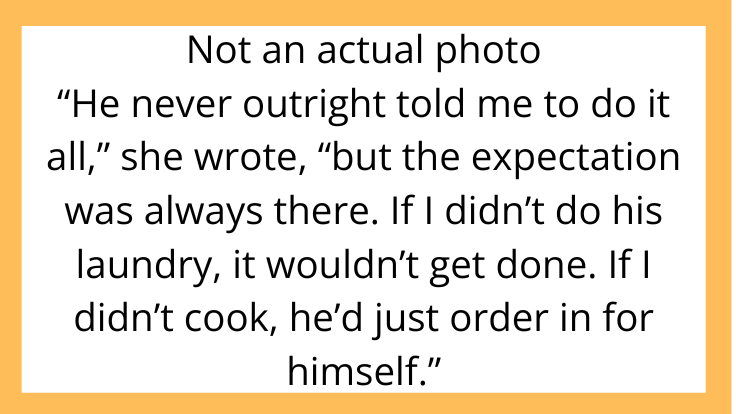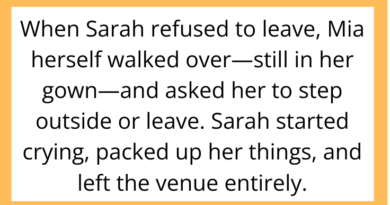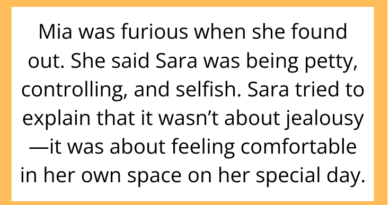AITAH for Telling My Husband I’m Not His Maid and Refusing to Do His Laundry Anymore?
In every relationship, unspoken expectations can quietly build resentment. But what happens when one partner finally says “enough”? Today’s AITAH-inspired story dives into a household showdown over gender roles, respect, and basic partnership.
Is standing your ground in a marriage being assertive—or selfish?
A Marriage Built on Uneven Chores

A 34-year-old woman—let’s call her Sara—took to Reddit’s r/AITAH community to vent her frustrations. Married for seven years to her husband, Amir, 36, she described how over time, she had taken on the bulk of the housework: cooking, cleaning, managing bills, organizing family events—and doing all of Amir’s laundry.
Despite both working full-time jobs, Sara felt the mental and physical load of running their home rested squarely on her shoulders.
“He never outright told me to do it all,” she wrote, “but the expectation was always there. If I didn’t do his laundry, it wouldn’t get done. If I didn’t cook, he’d just order in for himself.”
After years of bottling it up, one small moment pushed her over the edge.
The Breaking Point: A Pile of Dirty Laundry

One night, Sara came home after a long day at work to find a mountain of dirty clothes—again. Amir was on the couch, playing games. She asked if he could at least start his laundry. He laughed and said, “You’re better at it.”
That comment lit the match.
Sara calmly told Amir she would no longer be responsible for his laundry, cooking only for herself, and not cleaning up after him. “I’m your wife, not your maid,” she said.
Amir was stunned. He accused her of being dramatic, selfish, and “ruining the vibe” of their home. He argued that traditional marriages have “roles,” and she was abandoning hers.
Feeling guilty—but also justified—Sara turned to Reddit for perspective: AITAH for refusing to do my husband’s laundry anymore?
The Chore Gap: A Silent Relationship Killer

The Case for Sara: Boundaries Are Not Betrayal
Many Redditors rushed to Sara’s defense. They pointed out that emotional labor—like remembering to do chores, planning meals, managing the household—is still labor, even if it’s unpaid and unacknowledged.
Sara never agreed to a traditional marriage. In fact, she and Amir had previously discussed splitting chores equally. But over time, those promises eroded, leaving her feeling like a live-in housekeeper.
By saying “no more,” she wasn’t punishing Amir. She was protecting her energy and demanding the partnership she was promised.
The Case for Amir: Change Feels Like Rejection
From Amir’s perspective, the shift might have felt sudden. If this was their pattern for years, he may have assumed it worked for both of them. He saw Sara’s refusal as a change in their dynamic—and a threat to their relationship.
That said, his reaction—accusing her of selfishness and “ruining the vibe”—raised red flags for many readers. A mature partner listens, reflects, and adjusts, not lashes out.
Reddit Reacts: “You’re Not His Maid, You’re His Wife”

The r/AITAH community was nearly unanimous: Sara was not the villain.
“You’re doing 80% of the work while he reaps 100% of the benefits,” one user wrote. “Good for you for drawing the line.”
Others encouraged her to maintain the boundary and have a serious conversation about the future of their marriage.
Still, some did suggest one additional step: communication.
“Before blowing up a pattern, sit down and discuss expectations. Sometimes people don’t realize how lopsided things have become.”
The Bigger Issue: Resentment in Modern Marriages

This story isn’t just about laundry—it’s about equality, fairness, and respect in long-term relationships. Unspoken divisions of labor often cause one partner to feel overwhelmed while the other coasts through without noticing.
According to a study from the Pew Research Center, women still shoulder more household responsibilities, even in dual-income homes. And over time, that imbalance breeds frustration, resentment, and burnout.
Sara’s story is familiar to many: When we stop voicing small frustrations, they turn into big blowouts.
Moving Forward: Repair or Reconsider?

For Sara:
-
Stick to the boundary. Backsliding reinforces old patterns.
-
Suggest couples therapy to explore deeper issues.
-
Keep communication clear: this isn’t punishment—it’s partnership realignment.
For Amir:
-
Reflect on the impact of your assumptions.
-
Step up, not out—help carry the weight of your shared life.
-
Understand that equality in a marriage isn’t just financial—it’s emotional and practical too.
The Takeaway: Respect Is More Than Romance

You’re not the villain for saying no to unpaid labor you never agreed to. Relationships thrive on balance—and sometimes, that means shaking the snow globe when things settle in unfair patterns.
Sara didn’t stop loving her husband—she started loving herself enough to stop carrying the whole household.


